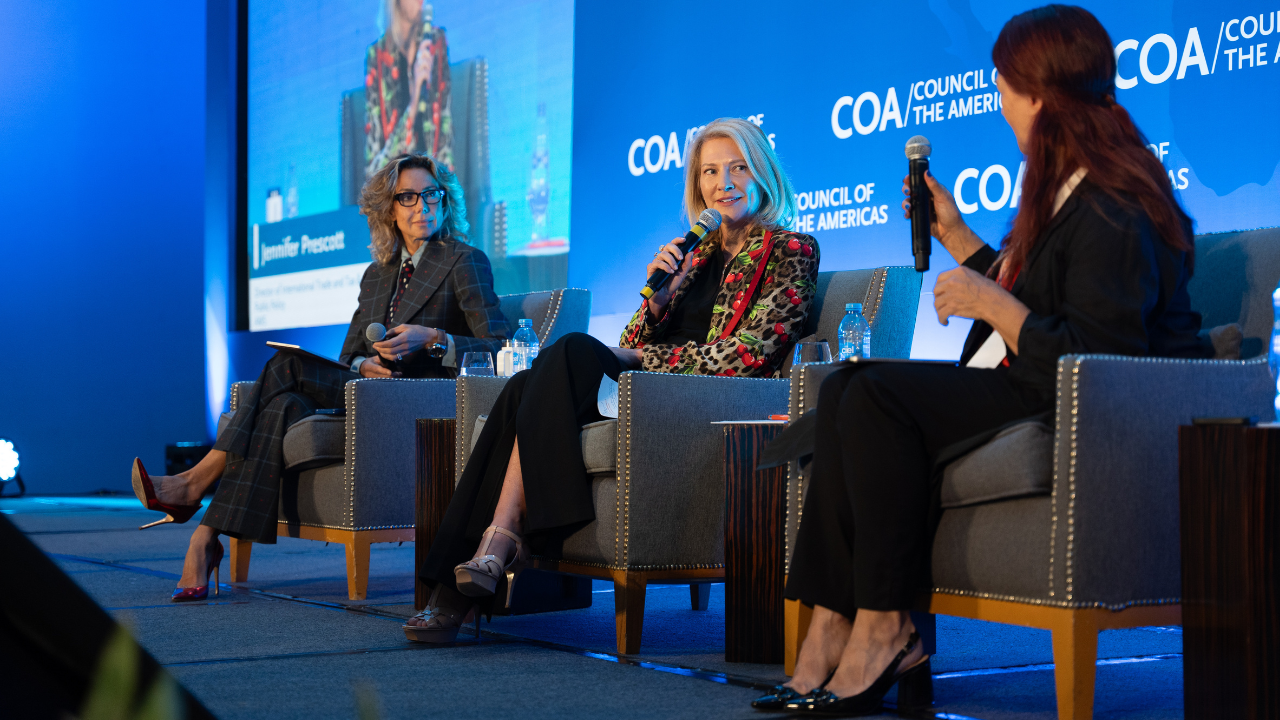Ciudad de México 2025: Boosting Mexico's Digital Transformation
Ciudad de México 2025: Boosting Mexico's Digital Transformation
In a bilingual conversation, Salma Jalife, Jennifer Prescott, and Alejandra Lagunes discussed the steps needed to power Mexico's technological progress.
Speakers/Oradores
- Jennifer Prescott, Director of International Trade and Tax & Latin America Public Policy, AWS
- Alejandra Lagunes, Founder, Alianza Nacional de Inteligencia Artificial (ANIA)
- Salma Jalife, President, Centro México Digital (moderator)
"Our digital economy is evolving, demonstrating an immense potential to become a leading digital hub, but we need to do a lot with respect to talent and the adoption of more advanced technologies," said Salma Jalife of Centro México Digital to open this panel at the 2025 Latin American Cities Conferences: Mexico City. Noting that major tech companies like Microsoft and Amazon have committed significant resources in Mexico, Jalife affirmed that "these investments are more than technological, they are strategic bets on Mexico's ability to become a regional digital hub, unlock economic growth, and build a more inclusive and high-value digital economy."
In order to facilitate this transformation, Jennifer Prescott of AWS emphasized the need for modern regulations and legal frameworks to guide cloud services and artificial intelligence while ensuring a sustainable energy supply. However, she warned, "if governments end up going into the overregulation space, that can really hamper the ability for companies and governments themselves to be able to fully leverage that technology [and] boost productivity."
Alejandra Lagunes of ANIA, who outlined the Mexican context of connectivity and digital skilling, stressed: "We need collaboration, collaboration with the legislature to create responsible regulations, with the government to make necessary and urgent public policies so that we don't fall too far behind in this era of artificial intelligence, and public-private collaboration." Lagunes said that this would help cultivate a "culture of innovation" in Mexico through more accessible digital education, improved infrastructure, and greater investor confidence.
"Nuestra economía digital está evolucionando y demuestra un inmenso potencial para convertirse en un hub digital relevante, pero nos queda mucho que hacer con respecto al talento y la adopción de tecnologías más avanzadas", dijo Salma Jalife del Centro México Digital al abrir este panel de la 2025 Latin American Cities Conferences: Mexico City. Observando que empresas de tecnología grandes tales como Microsoft y Amazon ya le han dedicado recursos significativos a México, Jalife afirmó que "estas inversiones no son solamente tecnológicas, sino también representan una apuesta estratégica para que México se convierta en un hub digital regional, aumente el crecimiento económico y construya una economía digital más inclusiva y de alto valor".
Jennifer Prescott de AWS enfatizó que para facilitar esta transformación, se necesitan construir regulaciones y marcos legales modernos relacionados a los servicios de almacenimiento en la nube y a la inteligencia artificial, así como asegurar un suministro sostenible de energía. Sin embrago, alertó que "si hay una sobreregulación por parte de los gobiernos, eso puede obstaculizar la capacidad de las firmas y los mismos gobiernos de aprovechar la tecnología y promover la productividad".
Alejandra Lagunes de ANIA, quién habló de la realidad mexicana en cuanto a la conectividad y las habilidades digitales, recalcó: "Necesitamos colaboración, la colaboración con el poder legislativo para hacer una regulación responsable, con el gobierno para hacer las políticas públicas necesarias y urgentes para que no nos quedemos tan atrás en esta era de inteligencia artificial, y con colaboraciones públicas-privadas". Lagunes dijo que esto ayudaría a cultivar "una cultura de inovación" en México a través de un mayor acceso a la educación digital, una mejora en la infraestructura, y más seguridad entre los inversionistas.








